8. Africa
Africa has immense potential owing to its rich natural resources and large population of approximately 1.3 billion. However, it is also facing various challenges including poverty, fragile health systems, and emerging terrorism and violent extremism. In order to tackle these challenges, Agenda 2063, Africa’s own new development initiative, was adopted at the Ordinary Session of the Assembly of the African Union (AU) in 2015, the same year the 2030 Agenda for Sustainable Development was adopted.
In 2020, while Africa reported a relatively low number of COVID-19 cases and deaths compared to other regions of the world, the pandemic severely affected the economic and social situation in Africa. In order to prevent the spread of COVID-19 and address its economic and social impacts, Japan is actively providing various support to African countries, including provision of health and medical equipment both bilaterally and through international organizations.
It was against this backdrop that Foreign Minister Motegi visited Tunisia, Mozambique, South Africa, and Mauritius from December 8 to 14, 2020, as well as Senegal and Kenya from January 11 to 13, 2021. It was the first time that a Japanese foreign minister visited a total of six African countries within the space of two months. Seizing the occasion of these visits, Foreign Minister Motegi delivered a strong message reaffirming Japan’s continued support of African-led efforts especially in the face of adversity of the COVID-19 pandemic, looking ahead to the 8th Tokyo International Conference on African Development (TICAD8) to be held in Tunisia in 2022.
● Japan’s Efforts
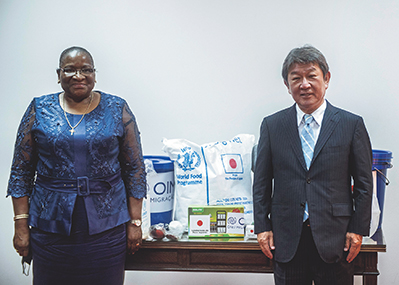
Foreign Minister Motegi together with Minister of Foreign Affairs and Cooperation Macamo during a visit to Mozambique, holding a handover ceremony for food assistance through the WFP and emergency grant aid for supply assistance in response to the humanitarian crisis in the Cabo Delgado Province and its neighboring regions (December 2020)
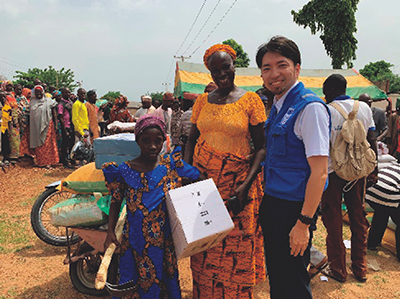
UNDP staff together with a returnee mother and child receiving agricultural materials distributed in Bazza Community in Adamawa, Nigeria (Photo: UNDP)
Since 1993, Japan has been leading the Tokyo International Conference on African Development (TICAD) co-hosted by the United Nations, the United Nations Development Programme (UNDP), the World Bank, and the African Union Commission (AUC). TICAD is a forum for African development to realize the principles of African ownership and international partnership.
Through TICAD, which has over a quarter century of history, Japan has been focusing on the promotion of the health sector as one of the priority areas and supporting the health and medical systems in Africa. At TICAD VI held in Nairobi, Kenya in 2016, Japan committed to strengthening the response to public health emergencies as well as the prevention of and preparedness for health crises and to promoting Universal Health Coverage (UHC) in Africa. At TICAD7 held in Yokohama in August 2019, Japan announced that it would further expand UHC, including countermeasures against infectious diseases and public-private partnerships. Japan will continue to play a leading role in strengthening international collaboration in the health sector in Africa based on its longstanding efforts in this area.
In addition to health, participants at TICAD7 held discussions on wide-ranging key issues related to African development under the theme of “Advancing Africa’s Development through People, Technology and Innovation” on three main pillars, Economy, Society, and Peace and Stability. Japan carries out the following initiatives under each of these three pillars in accordance with the “TICAD7: Japan’s contributions for Africa” announced at TICAD7, and will steadily proceed with its efforts, taking into account the impacts of COVID-19. Looking ahead to TICAD8, Japan will actively engage in various development issues in Africa that have been brought to light by the COVID-19 pandemic.
With regard to the first pillar, Economy, Japan develops industrial human resources who will contribute to the promotion of business in Africa, including through the ABE Initiative 3.0. Under the initiative, Japan has received over approximately 1,400 trainees from Africa thus far through JICA since TICAD V. Moreover, Japan also promotes quality infrastructure investment centered on the three priority areas Note 9 toward enhancing connectivity.
As for the second pillar, Society, Japan will further promote measures toward the expansion of UHC, and is engaged in efforts to build resilient health systems by improving access to basic healthcare and hygiene environments for three million people and promoting the health insurance system. Currently, Japan is contributing to the promotion of UHC including through the “Health Sector Policy Loan for Attainment of the UHC (Phase 2)” in Kenya and the “Project for Improving Continuum of Care for Mothers and Children through the Introduction of Combined Maternal and Child Health (MCH) Record Book” in Ghana. Such assistance Japan has provided thus far in the area of health is now demonstrating its true value in the COVID-19 pandemic. In addition, Japan is proceeding with efforts to provide quality education to three million children through the expansion of math and science education and improvement of learning environments.
Regarding the third pillar, Peace and Stability, under the New Approach for Peace and Stability in Africa (NAPSA)* advocated by Japan at TICAD7, Japan has been providing support for Africa-led efforts for conflict resolution, as well as assistance for institution building to address the root causes of issues such as conflict and terrorism (see also “Stories from the Field” for details). As a part of this initiative, Japan has provided support of over $100 million since 2008 to contribute to peace and stability in Africa through the TICAD process, which includes projects that have benefitted peacekeeping training centers in 15 African countries. Japan has also dispatched approximately 60 Japanese lecturers to strengthen training capabilities of the facilities and provide training at the facilities.
In the areas of Peace and Stability, Japan is also cooperating in the following African countries and regions.
In the Sahel region, as announced at the Special Conference on Peace and Stability in the Sahel Region held on the occasion of TICAD7, Japan is contributing to the peace and stability of the region under the banner of NAPSA by providing equipment for strengthened capacity of maintaining security, training for people engaging in institution building, vocational training and education opportunities for the youth, as well as support for human resources development for peacekeeping operations, placing a focus on the administrative vulnerabilities of Sahel countries. Japan is also continuing its assistance for refugees, internally displaced persons and host communities in the region.
In Mozambique, in addition to humanitarian aid for internally displaced persons and their host communities due to the deteriorating security conditions in Cabo Delgado Province, Foreign Minister Motegi signed and exchanged notes on grant aid related to the provision of rescue equipment for maritime accidents on his visit to the country in December 2020.
Since the independence of South Sudan in 2011, Japan has been supporting its nation-building through JICA and international organizations in areas such as infrastructure development, development of alternative industries, assistance for basic human needs, and enhancement of good governance. After the deterioration of the security situation in South Sudan in 2013, Japan has been cooperating with the international community to provide support for the consolidation of peace in the country through the Intergovernmental Authority on Development (IGAD), a regional organization of East Africa.
Furthermore, Japan is also providing support for the National Dialogue process, which is South Sudan’s own initiative for peacebuilding. Together with the assistance for human resources development in the areas of public finance management, strengthening capacities of police force and capacity building for customs personnel, as well as humanitarian assistance including food assistance, the support for the National Dialogue plays an important role in the restoration of peace and stability in South Sudan. In addition, although the activities of the Self-Defense Forces (SDF) engineering unit deployed to the United Nations Mission in the Republic of South Sudan (UNMISS) came to a close in May 2017, Japan continues its contributions to the UNMISS activities by dispatching staff personnel to the Mission Headquarters (from 2011 onwards, still in progress as of December 2020).
Moreover, Japan has been supporting the National Unity Day sports event, which is held annually by the Ministry of Culture, Youth and Sports of South Sudan, since it began in 2016 in order to promote the reconciliation, friendship, and unity of its citizens. It is important that the international community continues to cooperate and support the consolidation of peace in South Sudan in order for the population to realize peace and to avoid the recurrence of conflict.
Mauritius
Dispatch of the Japan Disaster Relief (JDR) Expert Teams in Response to the Oil Leakage Incident off the Coast of Mauritius (1st to 3rd Batches) and JICA Data Collection Survey Missions
(1) JDR Expert Teams, (2) JICA survey mission ((1) August 12-21, 2020 (first batch), August 21 – September 11, 2020 (second batch), September 4-18, 2020 (third batch), (2) October 24 – December 22, 2020 (environment and fisheries) and November 22 – December 21, 2020 / January – February 2021 (oil spill response and maritime safety))
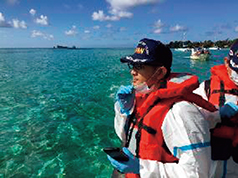
An offshore survey conducted in cooperation with the Government of Mauritius (August 13, 2020) (Photo: JICA)
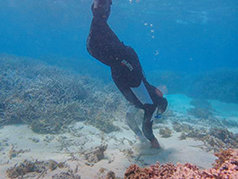
Work towards the implementation of long-term monitoring of corals (September 14, 2020) (Photo: JICA)
On July 25, 2020, a bulk carrier “WAKASHIO” got stranded off the southeastern coast of Mauritius, causing an oil spill beginning on August 6. Upon the request of the Government of Mauritius, the Government of Japan immediately decided to dispatch a Japan Disaster Relief (JDR) Expert Team to Mauritius, sending a total of three teams from August to September.
The first JDR Expert Team worked with the Government of Mauritius and relevant countries and organizations to survey the sea and coastline around the stranded ship and provided guidance and advice on oil spill response, including offering training to the National Coast Guard of Mauritius. Subsequent second and third teams conducted ecological surveys on the coral reefs around the incident site, inspection of mangrove forests growth and remaining oil, as well as review of the impact on birds.
The activities of JDR Expert Teams resulted in a wide range of positive achievements. In particular, their support to develop a long-term monitoring system to survey the impact of oil pollution on the coral reef and mangroves was highly appreciated by the country’s government officials and others. In addition, the experts’ recommendations on methods for removing oil from mangrove forests were not only recognized as useful, but were also adopted by those involved in the clean-up operations in the field, thereby contributing significantly to the conservation of the mangrove forests.
On September 7, Foreign Minister Motegi held a telephone talk with Prime Minister Jugnauth of Mauritius. Minister Motegi explained that the Government of Japan took the accident very seriously and would carry out cooperation of an unprecedented scale. In response, Prime Minister Jugnauth expressed his appreciation for the immediate dispatch of the JDR Expert Teams and the proposal of future cooperation, as well as his expectation to receive continuous support from Japan.
Furthermore, JICA survey missions were sent in October and November to collect information needed to formulate concrete future assistance plans based on the results of the JDR Expert Teams’ activities. The missions focused on recovering the environment/restoring the livelihoods of the people engaged in fishery, and oil spill response/maritime safety, respectively.
On December 13, Foreign Minister Motegi visited Mauritius to pay a courtesy call on Prime Minister Jugnauth and held a Japan-Mauritius Foreign Ministers’ meeting with Foreign Minister Bodha, where he presented the progress of Japan’s cooperation. In the afternoon of the same day, Foreign Minister Motegi inspected the extent of damages from the oil spill and the status of recovery while receiving a briefing from Mr. Maudhoo, Minister of Blue Economy, Marine Resources, Fisheries and Shipping of Mauritius.
Japan will continue to closely cooperate with the Government of Mauritius as well as relevant countries and organizations towards the restoration of the natural environment in the affected area and the recovery of economic activities of Mauritius from medium to long-term perspectives in a swift manner.
- *New Approach for Peace and Stability in Africa (NAPSA)
- The new approach advocated by Japan at TICAD7 held in Yokohama in August 2019, under which Japan is supporting African-led conflict prevention, mediation, and intervention efforts by the African Union (AU) and regional economic communities (RECs); institution building and strengthening of governance; and prevention of youth radicalization and strengthening resilience of local community, based on the principles of respecting Africa’s ownership and taking measures against root causes of conflict and terrorism.
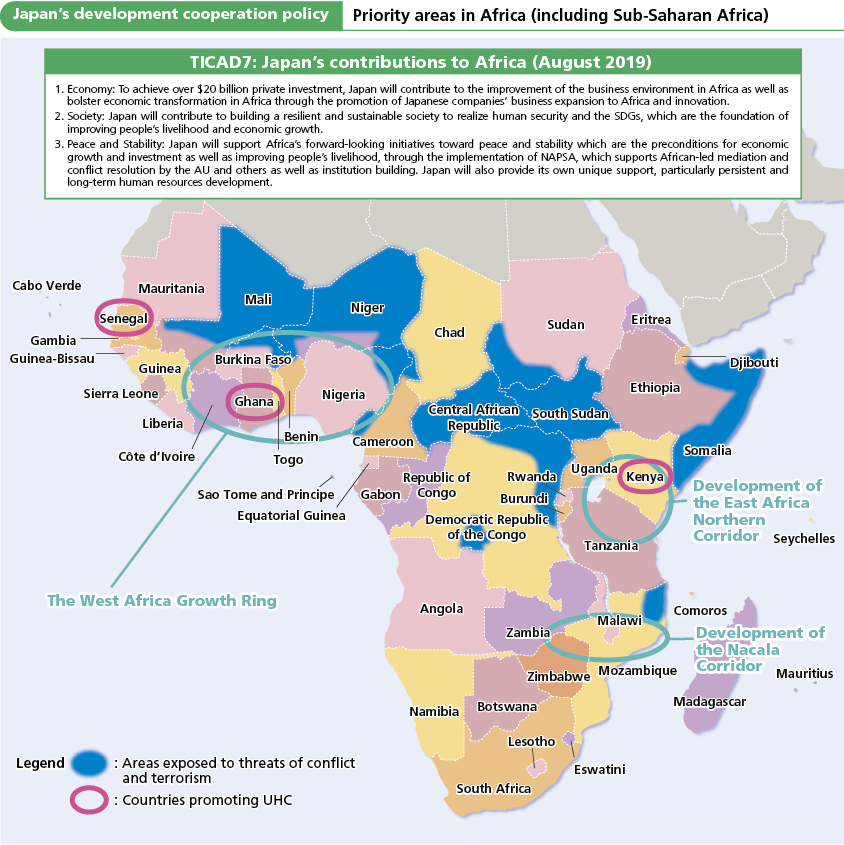
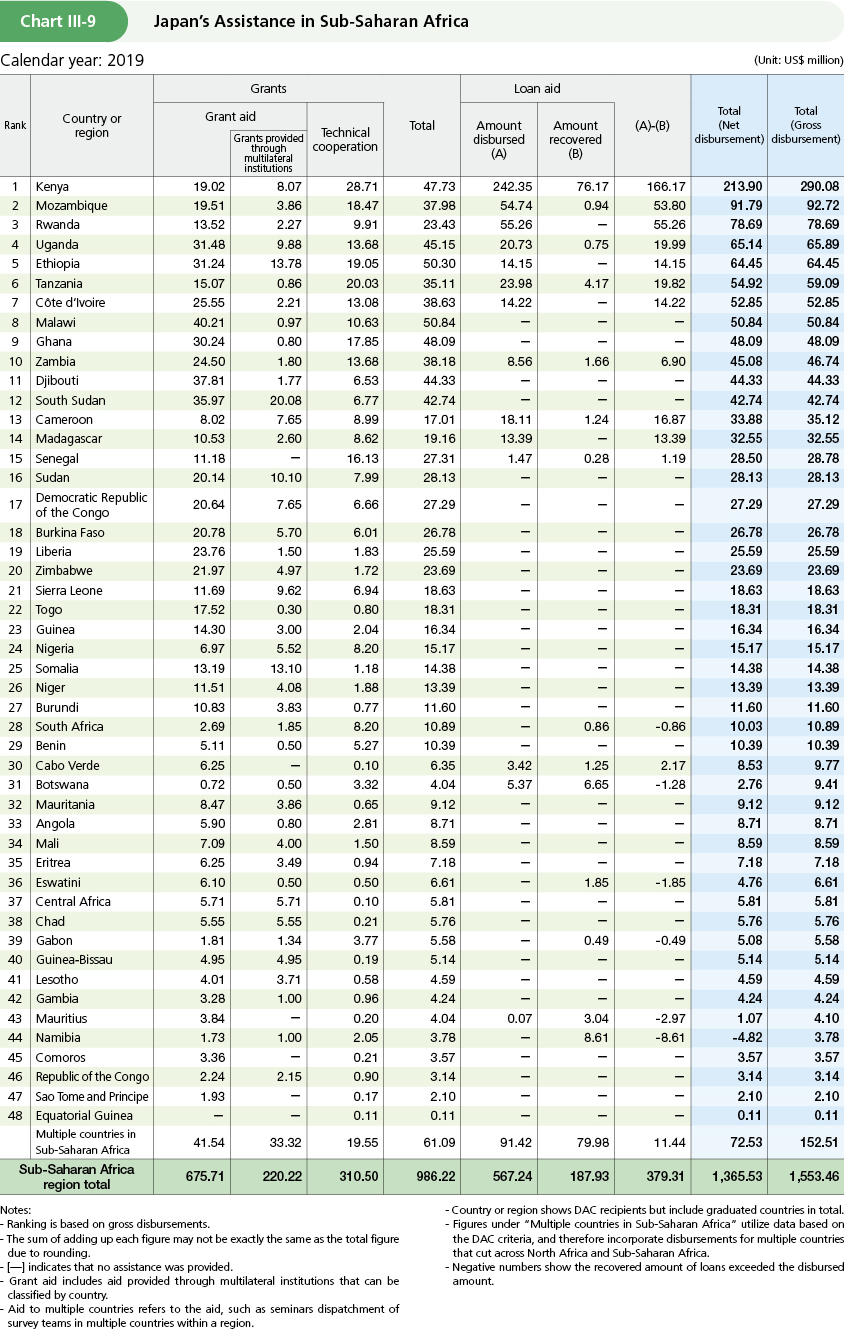
- Note 9: Three areas spanning the East Africa Northern Corridor, the Nacala Corridor, and the West Africa Growth Ring.
